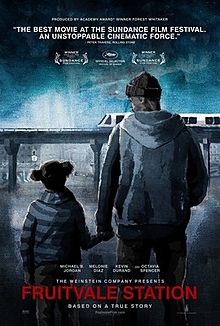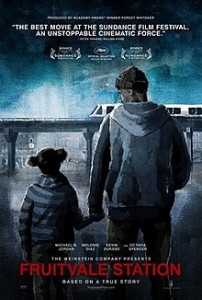by: Eric J. Grimm
Fruitvale Station. 2013. The Weinstein Company. Rated R. Written and directed by Ryan Coogler. Starring Michael B. Jordan, Melonie Diaz, and Octavia Spencer.
Ryan Coogler’s debut feature, the Sundance darling, Fruitvale Station, was released this weekend just in time for George Zimmerman’s exoneration. The film, a true story of a young black male who meets his fate at a stop-and-frisk in Oakland, California, is sure to play well throughout the summer and through awards season as the nation engages with the reality of how black men are frequently denied civil rights in a supposed post-racial America. It is unfortunate, however, that the film does not merit the recognition it has received. Far from being a call to arms, Fruitvale Station is an incomplete movie, littered with bad performances and unnecessary symbolic touches that render its upsetting story ineffective.
Michael B. Jordan has received much acclaim for playing doomed protagonist, Oscar Grant. Jordan plays his character’s conflicted nature ably as he shifts from charismatic to ferocious. I have no doubt that he’s a gifted actor who will do great things with better material, but the script throws so many cliched events at him, that he’s never able to shine through the muck. The film takes place on the day leading up to his altercation with the police and it shows Oscar taking every hour to make plans to turn his life around. There’s a scene with a stray pitbull that is so forced and manipulative that it tore me out of the film to reflect on how many characters in other films had been emotional wrecks over violence against animals. The scene was not based on an actual event in Grant’s life and this is no surprise. Coogler seems hellbent on stuffing events into the narrative which make Oscar as much of a tragic hero as possible. The scenes are clumsily assembled, and feature supporting actors and extras who are painfully aware they’re in a movie.
The rest of the actors don’t seem up to the challenge, either. Melonie Diaz made me wince as Oscar’s long-suffering girlfriend, Sophina, who is also the mother of his child. When she faces life-altering emotional trials in the film’s final act, she can’t muster a believable emotional response. Similarly, Oscar-winner Octavia Spencer is completely miscast as Oscar’s mother, Wanda. Her breakdowns don’t come from a place of authenticity. Spencer, who is better as a comedic actress, doesn’t show that she has the power to break your heart in scenes that need strong emotional responses. While I don’t think it’s always necessary to share experiences with one’s characters, the fact that Diaz and Spencer are not mothers in real life shows on the screen.
Coogler does the actors no favors. He directs from a distance, unable to get his message across through visually interesting storytelling. He makes an attempt at technological flourish by displaying Oscar’s cellphone use in the corner of the screen; we can see him compose text messages using a numbered keypad. This narrative device, however, is inconsistent and is dropped after an hour. Excusing the fact that it’s his debut feature, I couldn’t get past how Coogler rested on the power of the story instead of framing it in a more resonant context. By the time the film reaches its climax, I didn’t feel anything beyond some interest in the story’s actual details. I agree with Coogler that Oscar Grant’s story is perfect for a film narrative about disenfranchised black men, but I wish he had done something less obvious with the story and focused on crafting a film befitting his fascinating subject.
Fruitvale Station is playing at the Angelika Film Center with plans for expansion thought the summer.
—
















